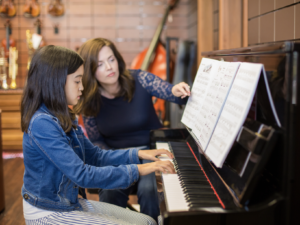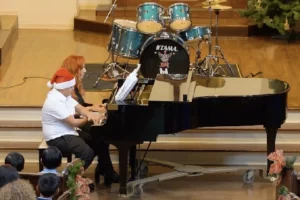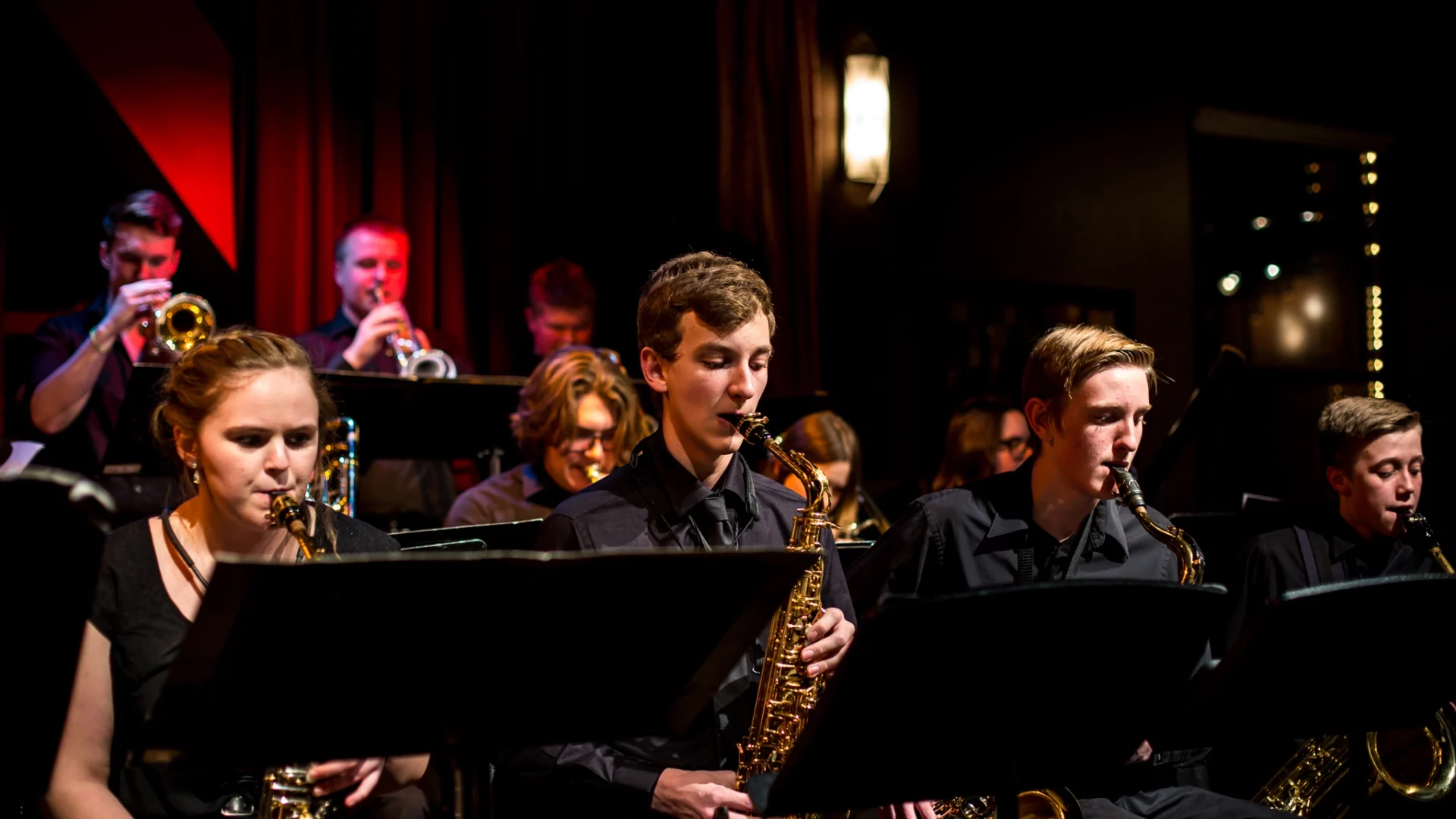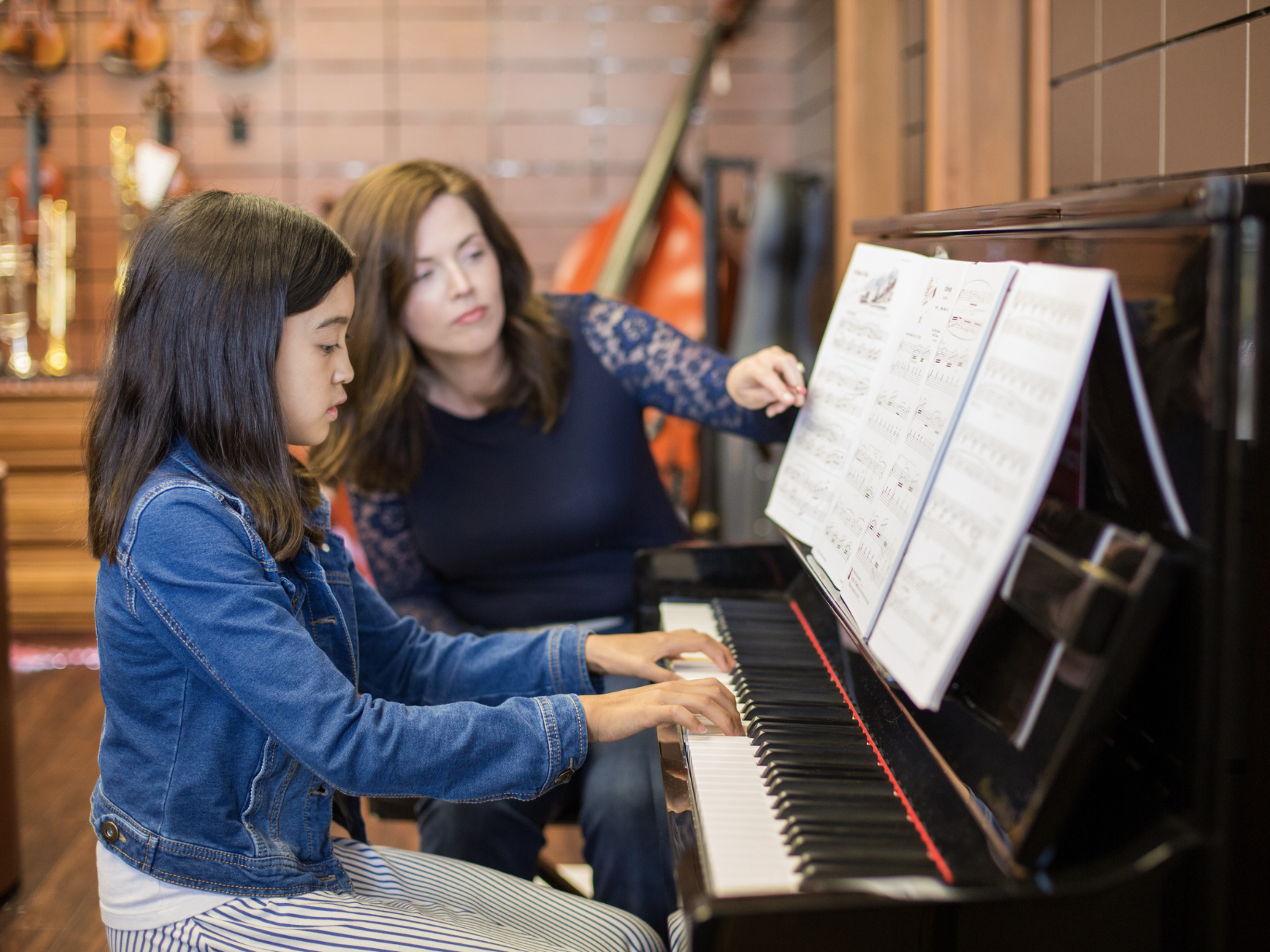The process of learning music is such an enriching experience. And naturally, learning any instrument can involve quite a bit of repetition. Of course, the routine of practice and repetition, though very beneficial in learning music, can eventually become quite monotonous. If you find yourself starting to lose interest and motivation when it’s time to sit down and play your scales, don’t worry. You’re not alone. Many pianists, both young and old, struggle to find joy in the repetitive nature of practicing. In this post, Murrieta and Menifee Academy of Music piano teachers and staff recommend seven ways to make your piano practice sessions after your private piano lessons productive, yet fun!
Table of Contents
- Tip 1. Set Goals and Track Your Progress
- Tip 2. Explore Different Styles and Genres
- Tip 3. Make Your Practice Sessions a Game
- Tip 4. Embrace a Bit of Technology
- Tip 5. Mix Up Your Practice Routine
- Tip 6. Collaborate with Others
- Tip 7. Embrace Your Creativity and Improve
Tip 1. Set Goals and Track Your Piano Lessons & Practicing Progress
Having clear goals is a very important variable to staying motivated during piano practice. Start by setting small, achievable goals for each practice session. These could be simply learning a new section of a new piece, or mastering a challenging line from your favorite composition. Write down those goals and track your progress consistently. A professional, highly educated, and patient piano teacher can be a great help in this area. At our Menifee Academy, our piano teachers work with students to develop a clear goal structure so that you are always on track toward progress. You can also use a practice journal or your student app to record your achievements and note areas that need improvement in. Seeing how far you’ve come can be extremely motivating and gratifying, and give you a sense of accomplishment needed to skyrocket your progress.
Tip 2. Explore Different Styles and Genres of Piano During Lessons and At Home
Don’t limit yourself to just classical piano. One way to make practicing piano more enjoyable is by exploring different genres that excite and inspire you. Consider learning popular songs, a bit of jazz, or even some fun T.V. theme songs.
Experimenting with different styles encourages creative expression while keeping things fresh and exciting. It’s okay to step outside of your comfort zone! You might just love what you find when you embrace the versatility of the piano and go on a musical adventure!
Tip 3. Make Your Practice Sessions a Game
Why not put an emphasis on ‘Play’ when it comes to playing piano? Turn it into a game! Challenge yourself with timed exercises or set up small rewards or prizes for meeting specific milestones. For example, you could treat yourself to your favorite dessert, or even take a break and read a chapter from your favorite book. If you want to take it up a notch, try creating practice challenges with friends or fellow musicians, or ask the Murrieta/Menifee Academy of Music office staff to provide you with a piano lessons practice challenge sheet! Complete it solo, or with others to see who can learn a specific piece the fastest! Friendly competition can fuel motivation and make practicing feel as exciting as it was on Day 1.

Tip 4. Embrace a Bit of Technology for Lessons and Practice
Technology offers countless resources to add life to your piano practice. Don’t be afraid to take advantage of it. There are interactive apps, online tutorials, and virtual supplementary piano lessons that provide engaging and interactive learning experiences. Don’t forget to use LessonRewind, the Academy’s proprietary software to keep track of your goals, accomplishments, and recordings from your class!
Additionally, you can explore apps that gamify practicing by offering interactive sheet music or virtual duets where you play along with recorded accompaniments. These tools not only make practice more enjoyable, but also provide instant feedback on your performance, helping you improve faster.
Tip 5. Mix Up Your Practice Routine
We already talked a bit about repetition and found that it’s beneficial and quite necessary for improvement, but that doesn’t mean it should be boring. To keep things interesting, mix up your practice routine on a consistent basis. Instead of starting every session with scales or technical exercises, begin by playing one of your favorite pieces if you can or try improvising freely for a few minutes. Maybe you could listen to a small portion of a song and see how much of it you can replay by ear. Changing the order of activities can also keep your mind engaged and prevent boredom.
Tip 6. Collaborate with Others Also Taking Piano or Music Lessons
Have you ever heard the saying, “no man is an island?”
Well with music this is true as well. There’s no harm in building a community to help learn and glean from each other while having a bit of fun. Don’t be afraid to invite friends also taking music or piano lessons over for jam sessions, join a band (check out the Murrieta and Menifee Academy’s RockStarz Bands), or maybe even invite a singer to the party and accompany them.
Tip 7. Embrace Your Creativity and Improve As a Pianist

The last tip came to us here at the Menifee Academy of Music quite naturally, and was the most fun. Just let loose! Set aside some time during each practice session to explore your own musical ideas. In singing, we call it ad-libbing. Improvising allows you to express yourself freely and develop a deeper connection with the instrument and the music. So try it. There’s really no right or wrong way to do it, so you can’t lose by just sitting at the piano and expressing yourself with a bit of free play. If you need more ideas your piano teacher at the Menifee or Murrieta Academy can provide more tips during your lessons. Remember, we are here to help!
Conclusion
Practicing piano doesn’t have to be a tedious chore. Incorporating some or all of these tips into your routine, can transform your practice sessions from blah to exciting. Remember, track your progress, explore different styles, turn practice into a game, use a little tech support, mix up your routine, invite some friends to the party, and embrace your creativity with a little free play. Playing the piano of course involves technical skills but it’s also about finding joy and expressing yourself through music. So go ahead, and see your passion for playing piano grow!


